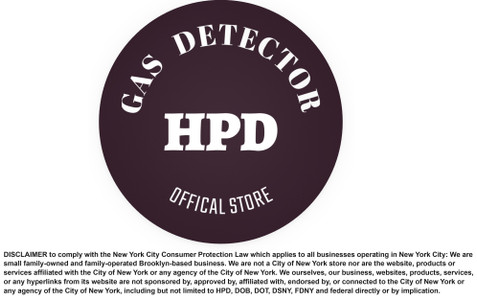Natural Gas Detectors HPD (Local Law 157 )
The Importance of Local Law 157: Mandating Gas Detectors in New York City Residential Buildings
Local Law 157, enacted in New York City, mandates the installation of natural gas detectors in residential buildings, significantly enhancing the safety and well-being of residents. This law addresses the critical need for early detection of natural gas leaks, which can pose severe risks including fires, explosions, and asphyxiation. By requiring these detectors, Local Law 157 reflects a proactive approach to preventing potential disasters and protecting public health.
Understanding Local Law 157
Local Law 157 was introduced as part of New York City's broader efforts to improve building safety and reduce the risks associated with natural gas. The law mandates the installation of natural gas detectors in all residential buildings, particularly in areas where gas appliances are used. This requirement is aimed at providing residents with early warning of gas leaks, allowing for timely evacuation and response to prevent accidents.
The Dangers of Natural Gas Leaks
Natural gas is commonly used for heating, cooking, and other household purposes. While it is an efficient and cost-effective energy source, it is also highly flammable and can be extremely dangerous if it leaks. Natural gas leaks can lead to fires and explosions, which can cause significant property damage and loss of life. Moreover, natural gas is odorless and colorless, making it difficult to detect without specialized equipment. Utility companies add a substance called mercaptan to give it a distinctive odor, but this scent might not always be noticeable, especially in small leaks or if residents have a diminished sense of smell.
The Role of Natural Gas Detectors
Natural gas detectors are devices designed to monitor the air for the presence of natural gas. When gas levels reach a certain threshold, the detector sounds an alarm to alert residents. This early warning system is crucial for preventing the dangers associated with gas leaks. Detectors are typically installed near gas appliances and in areas where gas lines are present to ensure comprehensive monitoring.
Implementation and Compliance
Compliance with Local Law 157 involves installing natural gas detectors in specified locations within residential buildings. Property owners and managers are responsible for ensuring that detectors are properly installed and maintained. Regular testing and maintenance of these devices are essential to ensure their functionality and reliability. By adhering to this law, property owners help to create a safer living environment for their tenants and reduce the risk of gas-related incidents.
Benefits of Local Law 157
The implementation of Local Law 157 brings several significant benefits:
- Enhanced Safety: Natural gas detectors provide early detection of gas leaks, allowing residents to take immediate action to prevent fires, explosions, and health hazards.
- Increased Awareness: The presence of detectors raises awareness among residents about the potential dangers of natural gas and the importance of monitoring for leaks.
- Peace of Mind: Knowing that their living space is equipped with gas detectors gives residents peace of mind and a sense of security.
- Compliance with Regulations: Property owners who comply with Local Law 157 avoid legal penalties and contribute to overall community safety.
Conclusion
Local Law 157 is a crucial regulation that enhances the safety of residential buildings in New York City by mandating the installation of natural gas detectors. These detectors play a vital role in providing early warning of gas leaks, helping to prevent potentially catastrophic events and protecting the health and well-being of residents. Compliance with this law is essential for creating safer living environments and ensuring that all residents are adequately protected from the dangers of natural gas. By understanding and adhering to Local Law 157, property owners and managers can significantly reduce the risks associated with natural gas and contribute to a safer, more secure community.
DISCLAIMER to comply with the New York City Consumer Protection Law which applies to all businesses operating in New York City: We are small family-owned and family-operated Brooklyn-based business. We are not a City of New York store nor are the website, products or services affiliated with the City of New York or any agency of the City of New York. We ourselves, our business, websites, products, services, or any hyperlinks from its website are not sponsored by, approved by, affiliated with, endorsed by, or connected to the City of New York or any agency of the City of New York, including but not limited to HPD, DOB, DOT, DSNY, FDNY and federal directly or by implication.
DISCLAIMER These codes may not be the most recent version. The State / federal or other regulation department may have more current or accurate information. We make no warranties or guarantees about the accuracy, completeness, or adequacy of the information contained on this site or the information linked to on the state site. Please check official sources.
The requirements for detector are determined by intended use and by applicable regulation. The BUYER is responsible for determining the appropriate detector needed. WE makes no warranty or representation of suitability of a detector to any code or for any specific application. IT IS THE CUSTOMER'S RESPONSIBILITY TO ENSURE THAT THE DETECTORS THE CUSTOMER ORDERS ARE IN COMPLIANCE WITH ALL STATE, FEDERAL, LOCAL, AND MUNICIPAL LAWS. Please review terms and conditions prior to purchase.
For more information about what is required, see the laws that are referenced and the rules applicable to your city and state. This page is for informational purposes only and is not intended as legal advice, professional advice or a statement of law. You may wish to consult with an attorney.





























